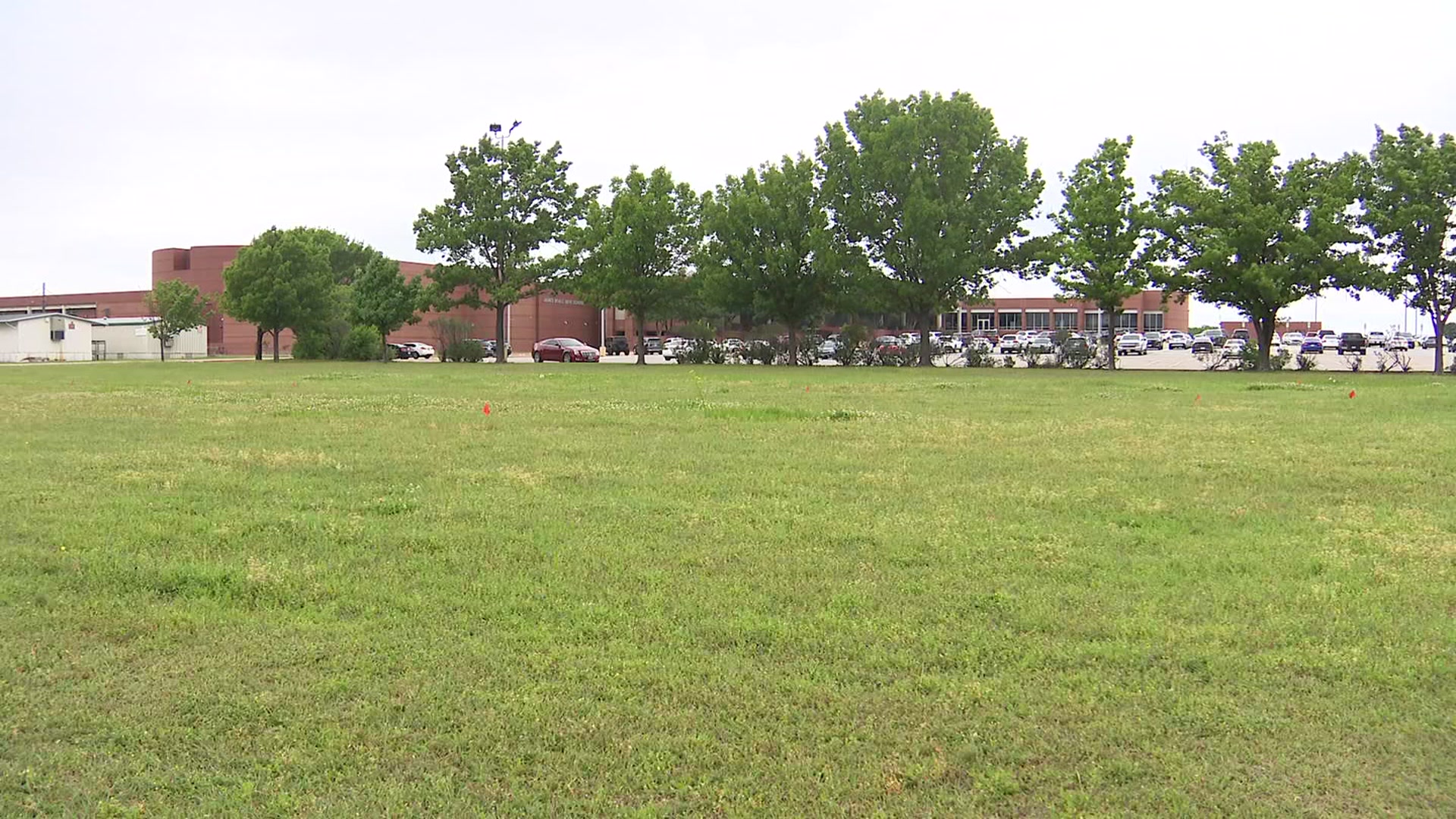Shortly before he was shot to death by a troubled former Marine at a Texas gun range, legendary Navy SEAL sniper Chris Kyle texted a buddy, "This dude is straight-up nuts," a defense attorney told jurors Wednesday.
A lawyer for Eddie Ray Routh said in opening statements of the man's murder trial that Routh's insanity was so evident that Kyle and his friend Chad Littlefield exchanged texts expressing alarm as the three rode together in February 2013 to a Texas shooting range.
"He's (sitting) right behind me, watch my six," Littlefield texted back, using a military reference for watching one's back.
But a prosecutor said that even with a history of mental illness, Routh still knew right from wrong.
The case has drawn intense interest, largely because of Kyle's memoir about being a sniper who served four tours in Iraq. The Oscar-nominated film based on the book has grossed nearly $300 million.
Erath County District Attorney Alan Nash described the 27-year-old Routh as "a troubled young man" who on the morning of the killings numbed himself with marijuana and whiskey. He said a history of mental illness should not absolve Routh of being accountable for the deaths.
"The evidence will show that mental illnesses, even the ones that this defendant may or may not have, don't deprive people from being good citizens, to know right from wrong," Nash said.
Local
The latest news from around North Texas.
Tim Moore, an attorney for Routh, said Kyle and Littlefield's text exchange shows how Routh was spiraling out of control. He told jurors that Routh was suffering from severe mental strain that day and thought he needed to kill the two or they would turn on him.
"He thought he had to take their lives or he was in danger," Moore said.
At the conclusion of the opening remarks, Judge Jason Cashon ordered all devices that could record or stream audio, or be used to report proceedings live, removed from the courtroom during the trial. Follow along with the trial as NBC 5's Ken Kalthoff, NBC's Jacob Rascon and The Dallas Morning News' Dianna Hunt and Tasha Tsiaperas tweet the latest updates from the overflow room outside of the courtroom. Their Twitter feeds can be seen below.
Tweets about from:kenkalthoffnbc5 OR from:ttsiaperas OR from:diannahunt OR from:jacobnbc !function(d,s,id){var js,fjs=d.getElementsByTagName(s)[0],p=/^http:/.test(d.location)?'http':'https';if(!d.getElementById(id)){js=d.createElement(s);js.id=id;js.src=p+"://platform.twitter.com/widgets.js";fjs.parentNode.insertBefore(js,fjs);}}(document,"script","twitter-wjs");
Routh was a small arms technician who served in Iraq and was deployed to earthquake-ravaged Haiti before leaving the Marines in 2010. Authorities say that after the February 2013 shooting, Routh drove to his sister's house in Kyle's truck, admitted to the killings and told his sister "people were sucking his soul."
Routh faces life in prison without parole if convicted.
Kyle's Widow Testifies
Taya Kyle, the widow of Chris Kyle, was among the first to testify against Routh.
She arrived at court Wednesday morning and was escorted into the courthouse by law enforcement.
Taya Kyle testified that Littlefield and her husband were close, and enjoyed spending time with veterans as a way to help them ease back into civilian life. She detailed her husband's own struggles after leaving the battlefield, saying he had post-traumatic stress disorder, was irritable and slowed by physical ailments.
She said her husband had been approached by Routh's mother to help her son. Chris Kyle took Routh to the shooting range at Rough Creek Lodge and Resort because it was located in beautiful country side and allowed for time to talk on the hour-and-a-half drive.
She said that as her husband left to go to the range, "we just said we loved each other and gave each other a hug and kiss."
She later called him around the time he arrived at Rough Creek and noticed her husband was unusually terse in their conversation. "It was short, like, `I wish I could say more,"' she said.
The widow testified that Littlefield and her husband were close, and enjoyed spending time with veterans as a way to help them ease back into civilian life. She detailed her husband's own struggles after leaving the battlefield, saying he had post-traumatic stress disorder, was irritable and slowed by physical ailments.
The defense asked if her husband could recognize when someone had been drinking before firing weapons, suggesting that Chris Kyle and Littlefield should have known as they rode with Routh that he was intoxicated.
Taya Kyle said her husband didn't condone drinking while using weapons, and testified that he was upset when he once attended an event where people who had consumed alcohol were firing weapons.
An employee at Rough Creek testified that he came upon the bodies of Kyle and Littlefield at the shooting range as he took a young guest and his father to meet Kyle. Both men were shot multiple times.
Graphic photos of the crime scene had been shown earlier, with Taya Kyle first stoic, then visibly upset as more close-up shots were shown. A couple of jurors also became tearful.
The intense attention on the case has brought renewed focus to the mental struggles former military members face.
Film Brings National Publicity
The Oscar-nominated film "American Sniper," which is based on Chris Kyle's autobiography of the same name, has brought national attention to Erath County, prompting lawyers for defendant Eddie Ray Routh to unsuccessfully argue that the trial should be moved or put on hold until the publicity fades.
District Judge Jason Cashon denied the change of venue, noting that the jury was seated with no more than two dozen people dismissed because of pretrial publicity.
Dozens of people, including members of the media, waited outside the Donald R. Jones Justice Center in Stephenville, about 50 miles southwest of Fort Worth, as the jury was seated this week.
"It's been a big deal around here," said Cory Flores, 25, who didn't know Kyle but said he hoped to get a seat to witness the trial.
Trial Opens in Rural Erath County
Eddie Ray Routh Capital Murder Trial
The jury of 10 women and two men seated Monday took the day off Tuesday as Routh and the lawyers appeared in court for last minute motions in the case. Routh faces life in prison without parole if convicted.
The defense team hopes to convince a jury that Routh was insane when he gunned down Kyle and Littlefield at the rural shooting range. His family members say he suffers from post-traumatic stress disorder.
Prosecutors aim to paint a much darker picture, describing Routh in recent court filings as a heavy drinker and marijuana user with a history of killing animals and threatening women with knives.
The state's filings say Routh smoked marijuana, drank excessively and had a history of killing small animals. They also say on Jan. 19, 2013, he threatened his girlfriend and her roommate with a kitchen knife and sword. He was taken to a mental hospital.
On the day of the killings, Routh had been drinking and smoking marijuana and again threatened his girlfriend with a knife, according to a legal filing. After his arrest, he allegedly threatened officers and caused problems while jailed, including flooding his cell.
Prosecutors seeking the capital murder conviction for the deaths Kyle and Littlefield filed documents Tuesday outlining "bad acts" and other offenses allegedly committed by Routh that they may want to share with the jury.
The judge ruled he would decide what to allow on a case-by-case basis. Here are some of the incidents included in the documents:
- From about 2000 through 2006 — Routh killed small animals and expressed an interest in watching them die, making statements that he "liked to hear them take their last breath."
- Around Jan. 2 or 3, 2012 — Routh was arrested for driving while intoxicated, convicted and served a short sentence. His driver's license was suspended.
- Sept. 2, 2012 — Routh was drinking and smoking marijuana at a family gathering when he got into an argument with his father. A physical altercation ensued and Routh threatened family members and threatened to kill himself. He was taken to a psychiatric hospital.
- Jan. 19, 2013 — Routh held his girlfriend and her roommate hostage at their apartment, threatening them with a knife and sword. Routh was taken to a psychiatric hospital.
- Around Feb. 2, 2013 — Routh made threats against officers who transported him to Erath County Jail following the shootings. The defendant was smoking and drinking alcohol the morning of the shootings, Feb. 2, 2013, and had again threatened his girlfriend with a knife.
- June 2013 — Routh flooded his cell, pulled TV and phone cords out of the wall and put his mattress in the shower. He also told a jail officer he was "trying to be good, but being an ass is more fun" and expressed a wish to get out and kill other people.
Post-Traumatic Stress Disorder
Eddie Ray Routh at Camp Fallujah
The intense attention on the case has also brought renewed focus to the mental struggles former military members face. Routh was a small arms technician who served in Iraq and was deployed to earthquake-ravaged Haiti before leaving the Marines in 2010. Authorities say that after the February 2013 shooting of Kyle and Littlefield, Routh drove to his sister's house in Kyle's truck, admitted to the killings and told his sister "people were sucking his soul."
The District Clerk released the questionnaire used to help select jurors from an original pool of 800 Erath County citizens. It covered military, media exposure and mental health issues. Routh’s relatives have said he suffered from Post-traumatic stress disorder at the time of the murders at the Rough Creek Lodge near Glen Rose.
In response to the attention the case drew, county officials had summoned more than four times as many potential jurors as they would for a regular trial — not unusual for a high-profile case.
The potential jury field was narrowed over two days last week, when would-be jurors filled out a questionnaire that included inquiries on whether they had seen the movie or read the book, served in the military, had a familiarity with firearms, or ever been treated for a mental condition.
Judge Jason Cashon agreed to allow pictures to be taken of Routh’s tattoos as evidence. He ruled the wives of victims Chris Kyle and Chad Littlefield will be allowed to attend the rest of the trial in person after they testify as witnesses.
The judge told jurors the trial could last two more weeks.
The state highway in front of the Erath County Justice Center will be closed while the trial is in session. Other security measures are already in place.
NBC 5's Todd L. Davis and Frank Heinz contributed to this report.



